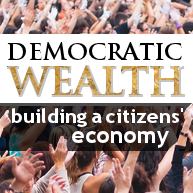
A Place beyond the Ballots: Women and the 2014 Elections in Afghanistan
2014 is a pivotal year for Afghan Politics. With the withdrawal of NATO troops, the 2014 elections have the potential to determine the country’s socio-political narrative. How these elections are conducted will impact the challenges and opportunities that Afghanistan will face. More specifically, what would this paradigm shift mean to a section of society that have come to represent one of its most repressed, neglected and disenfranchised aspects: the Afghan women. After decades of war and instability, women have finally been able to participate in politics and other male-dominated spheres of Afghan society. After the fall of the Taliban regime in 2001, the increasing presence of women in the Parliament, occupying seats alongside ‘warlords’ and other prominent male figures, has …

Plans for regional banks are a radical leap for Britain
Outside the banking sector and its critics, not everyone grasped the radicalism of Ed Miliband’s announcement a few weeks ago that the next Labour government will establish a network of regional banks. But this was policymaking at its best, signalling a commitment to radically reform the relationship between finance and the real economy and a determination to make Labour the party of small businesses across the nation.
The British banking system is astonishingly uncompetitive: 89 per cent of all our businesses are dependent on the five major clearing banks. Yet over the last 30 years these banks have become disconnected from the needs of these businesses, seeking quick profits in the City and in the property markets rather than long term investments in the industries and regions outside the southeast. Duncan Weldon has calculated that, in the decade before the crisis, 84% of the money lent to British residents by British banks went into property and financial services.

The Alaska Model: a citizen’s income in practice
Basic income is a regular unconditional cash grant paid to all citizens without any means test or work requirement. It’s often dismissed as a utopian idea.
However, a basic income, or something very close to it, exists today in Alaska. It’s called the Permanent Fund Dividend (PFD) or sometimes “the Alaska Dividend.”
The PFD has been paying annual dividends to Alaskans since 1982 with no conditions except citizenship, residency, and the willingness to fill out a form. After following the Alaska Dividend since 1999, and I want to share six lessons that supporters of progressive economic policy should learn from what I call “the Alaska model,” but first some basic background.
In 1956, Alaska ratified a constitution recognizing joint ownership of unoccupied land and natural resources. In 1967, North America’s largest oil reserve was discovered in state owned areas on Alaska’s North Slope. In 1976, a state referendum created the Alaska Permanent Fund (APF), a portfolio of diversified assets, into which the government would invest a small part of the state’s oil revenue each year as a way to turn the temporary stream of oil money into permanent wealth. Back then, the state had no plan for what to do with the APF. In 1982, the state government finally decided to distribute part of the returns from that fund as a yearly dividend, and the Alaska model was born. The APF continues to rise with yearly deposits from oil revenue, and it goes up and down with the financial markets.

Anarchists and Republicans: Bedfellows?
In 1797 two of the foremost radical social critics of their day Mary Wollstonecraft and William Godwin married in order to legitimate their unborn child. Both opposed the institution of marriage but they hoped to avoid the scandal and prejudice that had accompanied Wollstonecraft’s first illegitimate child. Their brief relationship was one of the happiest periods in their often tumultuous lives but was tragically cut short by Wollstonecraft’s death in childbirth.[i] Wollstonecraft’s powerful feminist critique of the patriarchal beliefs and institutions of her day drew on many republican themes, extending the traditional republican concern with political domination to the social domination of husbands over wives.[ii] Godwin’s philosophical rejection of external authority and his exposition of a decentralized voluntary society free from the state has led many to classify him as an early anarchist thinker.[iii] If their marriage could be considered the highpoint of relations between republicanism and anarchism, the two traditions have since followed very different ideological and political paths. In what follows I consider what, if any, potential overlap there is today between these two often neglected political theories.

Freedom and Meaningful Work: An exploration
Meaningful work is an ideal with a long history. It retains a strong hold upon the popular imagination. Whether it is work which is useful, involving, worthwhile, satisfying or inspirational, we all know meaningful work when we see it. Generally, we think of meaningful work as a luxury good or scarce resource – something a few lucky people possess, and which is simply a matter of private interest. We do not think of meaningful work as important for social development, or take seriously the possibility that all work ought to be meaningful. This is despite the fact that having to do non-meaningful work harms a person – including poor health outcomes, frustrated human capabilities, diminished life chances, or even the absence of a sense that life is worth living. And in any case, since most of the work we do is irretrievably dull, repetitive or subject to hierarchical authority, hankering after meaningful work for everyone seems unattainably utopian.

Growth vs Equity: What the John Lewis strike says about outsourcing and employee ownership
John Lewis’s outsourced cleaners are striking for a living wage. You might be inclined to file that under obvious – where in the world are cleaners not outsourced and underpaid? With John Lewis, though, it points to an important general problem with the viability of employee ownership of businesses (for readers outside Britain, the John Lewis Partnership is owned by its 81,000 employees; it is a successful operator of department stores and supermarkets, and its annual profit-sharing bonus for employees is widely reported in the media).
Since the 1950s, economists have speculated that a profitable employee-owned business would not grow as much as the same business would if it were owned by capitalists, because the incumbent workers would not want to dilute their individual shares of profits by adding new worker-owners. This argument is known as the Illyrian Model, for reasons to do with the name of a province of the Roman Empire and the practice of worker-self management in Communist Yugoslavia, but that’s a story for another time. Within a capitalist economy, workers who happen to own their business can try to have the best of both worlds. By hiring non-owner employees whenever an opportunity for growth presents itself a two-tier system is produced – owners and non-owners – and this has been widely seen as leading to the degeneration of the worker-owned company, marking its gradual descent into capitalist ownership. Notice that the Illyrian model is both a prediction about the fate that will befall worker-owned enterprises (they will either stay small, or stop being worker-owned), and an explanation for why worker ownership is not more widespread.
John Lewis has long been seen as an important counter-example to the Illyrian model, a case which casts doubt on the economists’ gloomy prediction.

The Optimistic Agonist: An interview with Bonnie Honig
[The political theorist Bonnie Honig talks to IPPR’s Juncture about the roots of her thinking, the radical and positive potential of political contestation and the importance of ‘public things’ in a vibrant democracy.]
Nick Pearce: What’s noticeable about your work is that you have an engagement with continental theory which isn’t typical of Anglo-Saxon political philosophy. Where does that come from?
Bonnie Honig: In the mid to late ‘80s I was in graduate school at John Hopkins University, where French theory was quite central to the humanities and the humanistic social sciences. Reading in that literature you take on board some of its conceptual apparatus, even if you are establishing your own relationship with it. So certain terms, like interpellation and discipline and normalisation, entered into my own vocabulary.
The words stood for ideas I needed to draw on. If I blend analytic and continental archives, it was because I was driven to do so by my work on Hannah Arendt.

Defending the 99%: Still a ‘slogan’ for our times
[The following piece is a reply to Craig Berry’s Unpacking the 99% (see below), in which he argues that the slogan may be unhelpful for Britain, as it obscures the realities of actual wealth distribution.] The statement ‘We are the 99%’ has the resounding attributes of any truly powerful slogan. It not only captures an issue but creates an identity. The true power in the slogan is that for perhaps the first time, the myriad interest groups within the 99% realised they had more in common with each other, than the 1%. This is a vital step in any truly republican movement. In defending the 99% slogan, one must first attest to its accurate portrayal of the single greatest failure of neoliberalism; breathtakingly unequal distribution of wealth. James S Henry, former chief economist for McKinsey and now steering committee member for the Tax Justice Network, presented global wealth distribution figures in 2012 to illustrate this point. According to Henry, just 0.1% of the world’s population owns 81% of the wealth; the other 99.9% of people left with 19% of the wealth. This is a quite stunning failure of an ideology that purports to be the champion of fairness, justice and opportunity. It is quite right that this be called out, and that the 99% understand their position not only relative to each other, but in the broader context which goes practically unspoken in popular discourse.
[This is the final piece of a trio exploring wealth distribution in Britain. See the first, Policy commission on UK wealth distribution, by Karen Rowlingson. It sits within our Democratic Wealth debate, in partnership with OurKingdom.









